FAQs & Etiquette
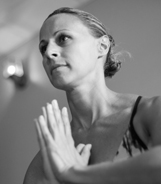
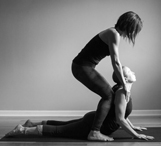
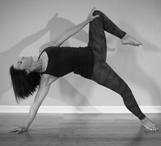
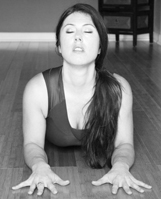


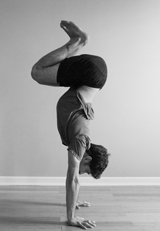
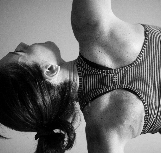
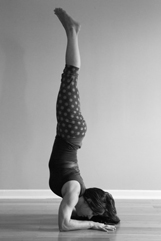

What is yoga?
In Sanskrit, the word yoga means union or to yoke. Many yoga practitioners feel the practice links and unify the body, mind, and spirit. Yoga can also be helpful in slowing down the noise of our minds. This can result in living without fear, anxiety, anger, and other negativity. As the practice builds our love can grow. We become more present in each moment of our day. It is easier to not only concentrate but we laugh and smile and have fun more easily.
Is yoga for everyone?
Everyone regardless of age or level of health can practice yoga. The practice can be adapted and modified for all levels. It is always a good idea to check with your physician before starting a yoga practice especially if you have an illness or injury.
What can yoga do for me?
Yoga offers so many benefits. Calm, clear mind, better health, increased flexibility, improved breathing skills, freer movement and even better relationships. Yoga will help you to relieve stress, build body strength, build better balance by toning the muscles and working the entire body. The core strength will improve back issues, and the poses will help to open and release the lower back and free space in the vertebrae.
How do I choose a yoga class?
If you have never done yoga before, start with a beginner class or schedule a couple of private classes with a teacher. Experiencing yoga for yourself will help you and your instructor determine what level you will be comfortable with. Remember, you can always rest at any point in any class. If you are an experienced yogi please refer to our class descriptions and schedule. Please join us!
Will I lose weight doing yoga?
Many people have lost weight doing yoga. It is by no means a quick fix. The poses will help build muscle and burn fat away. With yoga you can build core strength and increase flexibility. As the body changes a you begin to feel more comfortable with yourself. The confidence that comes with feeling good about yourself makes you more mindful about the choices of food, drink and sleep habits you make.
Does yoga help a bad back or other injury?
First take it slow, and be sure to tell your instructor about any pain or injuries you have. They will help you modify or avoid the poses that can be troublesome. Most importantly, if anything ever hurts, back out of the pose. Take good care of yourself. Nothing is worth hurting yourself or injuring yourself over. The strength building aspect of yoga will work to ease back troubles for many people. However, it is important to keep in mind that everyone is different and has different tolerances.
I’m not flexible – can I still do yoga?
Flexibility is not important in yoga. Many practitioners are inflexible. Doing the poses and the breath techniques sooth the body and the mind. Your yoga practice will help you to increase your flexibility. We want you to come enjoy those benefits regardless of flexibility, weight or any bad habit. The important thing is to come.
Is yoga a religion?
No. Yoga is a physical and mental practice that does not require a religious belief system. Any and all people regardless of their religious belief can practice yoga without worry that they will need to bend to an outside belief. Some people do deepen their own spirituality when they experience the heart opening aspect of yoga.
Why is “Om” chanted?
Om is a beautiful sound that creates a wonderful vibration through the room and in the body. It was considered by the ancients to be the universal sound of creation. Participating in forming the “om” sound is not required in our classes. If you choose to remain silent it does not offend anyone. Please feel at home in our studio.
Why do you rest after class?
The final pose in class is Savasana. This is a resting pose. We do this to allow the body to absorb the energy and work that you did in class. It is considered to be the most important pose in the practice because it allows you to integrate your mental intention with your physical exertion. If you need to leave a class early, please take a few minutes before doing so to rest in Savasana on your own.
What does Namaste mean?
The general translation is “spirit in me acknowledges and bows to the spirit in you.” It is mainly used as a greeting or farewell to honor the recipient.
The Proper Etiquette for a Yoga Class
Yoga, an ancient and beautiful tradition, draws a certain level of good etiquette. We sincerely hope that as a devoted yogi/yogini you will observe these simple rules based in common sense, courtesy and respect for each other, our teachers and the studio. Most of us have good intentions but, we are occasionally tempted to rush through something and don’t think about how it may be affecting others sharing the space with us.
We want everyone to have a peaceful and enjoyable journey in each and every class at ignite. The following rules of good etiquette should help you feel comfortable when entering our studio.
• If you have health problems, injuries, or are pregnant tell your teacher. He or She will be able to tell the poses that you should avoid and the modified poses that you can do.
• Be on time. If you are late enter quietly if the class is chanting or in meditation wait before you roll out your mat. If class is in session warm up properly. Tell the teacher if you know you must leave early. Make every effort to start and finish with the class.
• Never wear your shoes inside the studio. Bring valuables in with you.
• Turn off your mobile phone or other electronic devices that can disrupt the serenity of the room. Refrain from checking your messages during class.
• Be perfume-free. Strong fragrances, scented oils, or fragrant lotions can be distracting for some people in the room.
• Wear comfortable clothing that properly covers all of you even when you go upside down. Don’t wear socks unless they are specifically made for yoga.
• Respect the space of other people in the class. Do not walk on other people’s yoga mats.
• Silence is important in a Yoga session. Help maintain the serenity of the room by keeping your voice down. Do not have private conversations in a class. Also remember to keep your voices low when you are out in the common area. You may feel invigorated after class, but your voice will travel far in the tranquil environment of the studio.
• Do not eat food or chew gum during practice.
• Do not skip Savasana. The final relaxation pose after every class is very important, so do not leave the room without doing it even if you must leave early.
• Neatly replace the studio’s props you have used during class.
